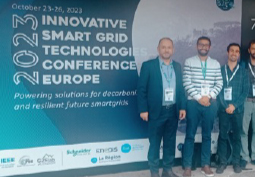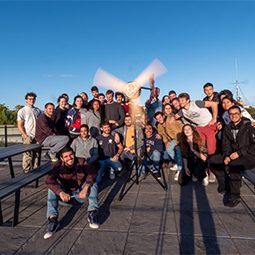| Mots-clés | Digitalisation de l'énergie, data science, smart grids, prévision, optimisation, traitement du langage naturel Energy digitalisation, data science, smart grids, forecasting, optimisation, natural language processing |
| Résumé | Context and challenges:
Short-term forecasts of energy demand (electricity, heating/cooling, gas) at local level, ranging from a single household up to a group of buildings, a district, a node of the grid or a microgrid, become more and more necessary in the context of smart grids. Several new business models emerge, where the involved actors require such forecasts (together with information on the associated uncertainty) for a few minutes to days ahead in order to manage the corresponding energy systems. The objective may be auto-consumption (when generation and/or storage capabilities are available), provision of flexibility services to the grid, energy exchanges with other members of an energy community a.o. Although the literature on electricity forecasting at a national level is broad and the accuracy of existing models is very high, this is not the case for demand at local level. The existing models are not adapted to the ongoing transformation and digitalization of energy networks and the electrification of new usages that results in increasing demand by consumers (i.e. electric vehicles charging). Furthermore, the integration of high shares of renewables (wind, solar) is a challenge for grid operators. It becomes more and more necessary to adopt solutions that permit to adapt consumption to the variable renewable generation. For that, they deploy technologies that enable more flexibility of the consumption (e.g. load shifting, EV charging in zones with lower grid operational constraints, etc.). The activation of such flexibility options becomes more frequent and concerns more and more consumers. This induces spatio-temporal modifications in energy consumption patterns. As digital information has become central in the organization and dynamic behavior of both rural and urban territories, an efficient treatment of contextual information regarding the expected use of energy at the local scale is needed. Main objective of the thesis:
The overall objective of the thesis is to develop a forecasting approach for local energy demand that is flexibility-aware, i.e. that can adapt to flexibility activations from energy networks (electricity, heat/cold, gas). The forecasting approach will be able to integrate contextual information relative to local situations, e.g. traffic, environmental conditions, weather conditions, news and social media.
Methodology and expected results:
The first step of this thesis will be to characterize and define typical patterns of energy demand at local level as a function of the aggregation of consumers (from single households up to tens or hundreds of consumers). Then existing load forecasting methods will be applied to estimate the reference performance that can be achieved. Several sources of input data, like smart meters data, weather forecasts, EV charging information etc. will be considered. The sensitivity of the existing methods on missing data will be studied together with the contribution of spatiotemporal information (i.e. measurements from neighbor smart homes with similar consumption profiles). It will be studied what are the requirements of the considered and future applications (use cases) for forecasting models that have to be taken into account in the design of such models. I.e. if they have to operate autonomously (i.e. at the âedgeâ or at automats with minimal maintenance and tuning requirements), if they have to be adaptive to structural changes of the consumption (i.e. addition of new usages), their robustness on missing data, their sensitivity on personal information a.o. In a next step, the contribution of NLP (natural language processing methods) methods will be assessed. Existing models developed at PERSEE for prediction at regional and national level will be considered. These methods will extract explanatory variables from text and audiovisual sources that are potentially informative for local energy consumption. Language data generated by AI will be integrated into the NLP methodology, which requires potentially AI detection and ethics analysis. Representative case studies will be provided by ongoing projects and will prioritize open-source datasets. A second step will be dedicated to the dynamic adaptation of the forecasting approach to massive penetration of flexibility in energy networks, e.g. from the electric distribution and transmission systems. This means to develop a prediction of the evolution of local demand before, during and after flexibility activations of different characteristics, durations and amplitudes. |
| Profil candidat | ... PROFILE:
Engineer and / or Master of Science degree (candidates may apply prior to obtaining their master's degree. The PhD will start though after the degree is succesfully obtained).
Good level of general and scientific culture. Good analytical, synthesis, innovation and communication skills. Qualities of adaptability and creativity. Motivation for research activity. Coherent professional project. Skills in programming (eg R, Python, Julia,â¦). A succesful candidate will have a solid background in three or more of the following competencies:
⢠applied mathematics, statistics and probabilities
⢠data science, artificial intelligence
⢠energy forecasting
⢠optimisation
⢠power system management, integration of renewables
Expected level in french : bon niveau souhaitable
Expected level in english : excellent
TO APPLY:
Please send the following elements by email to Prof. Georges Kariniotakis (georges.kariniotakis@minesparis.psl.eu) AND to Dr. Simon Camal (simon.camal@minesparis.psl.eu):
* Curriculum vitae (CV).
* Motivational letter for the application (cover letter).
* Contact details of two individuals that can provide a letter of reference (and eventually available already letters of reference).
* Copy of grade transcripts and last diploma (in English or French).
Please use in the title of email the acronym of this PhD topic 'PHD-2024-ERSEI-PreviConso'
Deadline for applications: 29/02/2024. The position will remain though open until a suitable candidate is found.
Do not hesitate to email to the above addresses for an early expression of interest and for further information on the position. |










